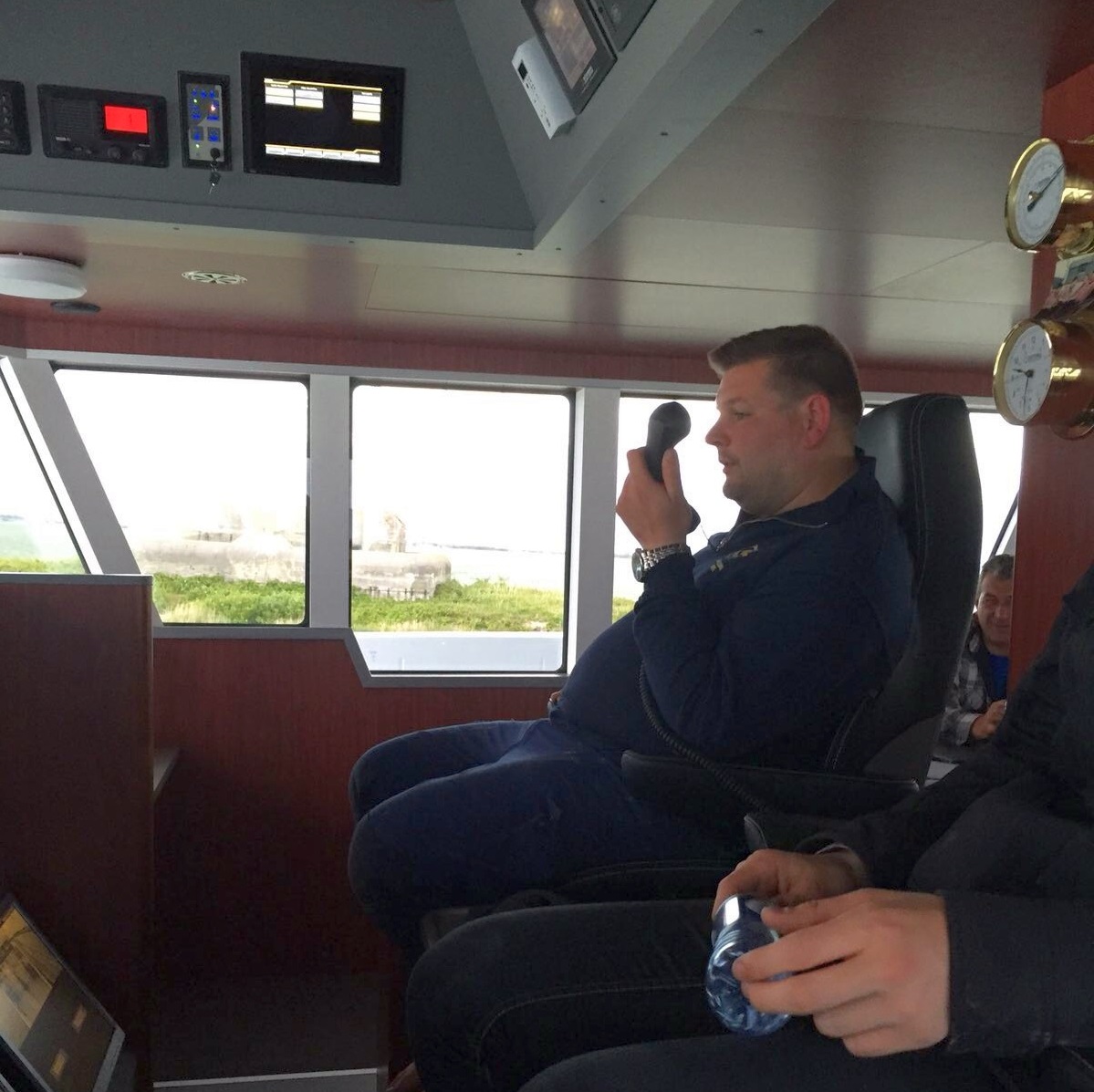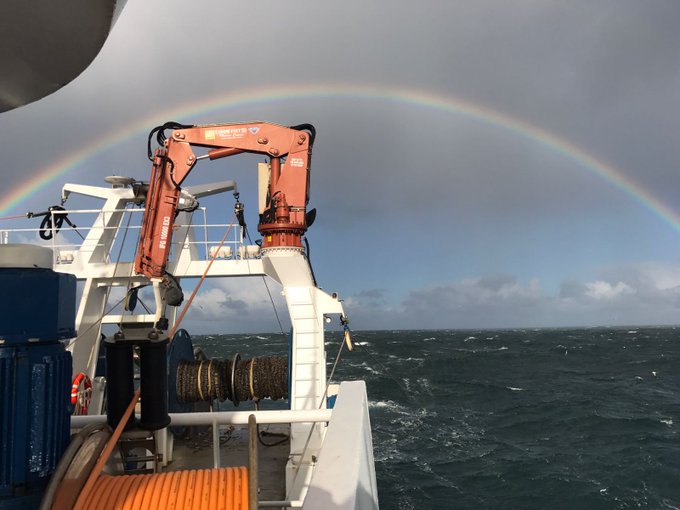Twitter was alive with Dutch fishermen posting comments following the banning of pulse fishing - many claining that the media had once again swung the vote and allowed the heart to over-rule the head and the council ruling over science-based evidence.
Even skippers with internet access at sea joined in the conversation and posted heart-felt comments form their wheelhouses!Nu op de Noordzee. pic.twitter.com/eNwvcdJdc9
One of those skippers, with one of the most advanced boats in the fleet which uses pulse fishing at certain times of the year sails aboard his boat Dirk Romkes.
On the bridge at ... Dirk Romkes (MDV-1)
In the section 'On the bridge at ...' we get to know a member of the Dutch Fishermen's Union, to learn more about the person behind the fisherman.
He had his very first meeting this morning in the Council of Members of the Dutch Fishermen's Union. "Good, fun, interesting. You will also hear more about developments that you would otherwise not really get. I find it interesting to be able to think and talk, "says Dirk Romkes, skipper on the MDV-1 Immanuel.
Dirk (36) is married and the father of three sons, aged eleven, seven and two years. That family is - in addition to work on board - his biggest hobby. "No sport or anything else, just the time I can spend with the family and go out together. On weekdays I am busy with fish, so I choose to spend my free time with my wife and sons. "

Fascinating experiment
"The crew of our ship consists of five men. We fish in the summer with the normal twinrig on the Dogger Bank on plaice, turbot and lemon sole. Usually we land the catch in Harlingen, after which the fish is sold at the exit of Urk. Now in the winter we often fish a bit closer to the coast, on sole. We do this with the experimental twinrig pulse. Nice job: pull, adjust the rig, try again. The results were getting better. Fascinating to be busy with, but unfortunately that is now thwarted by Europe. "
"My younger brother works in ICT"
Although Dirk grew up in the fishing industry and the fishing profession also went from father to son in the Romkes - his father and younger brother sailed on another cutter who is part of the family business - he deliberately chose the profession himself. "I always liked fishing. My parents have always released us in our choice for the future. My youngest brother has opted for something completely different, he works in ICT. "
"What makes sailing and fishing so beautiful? Yes, that is still the freedom you feel at sea. The space, beautiful sunrises and sunsets, the nature around you, jan-van-gents who show their diving skills behind the ship. At sea you experience everything more intensively. Recently we had a passenger on board who was very impressed everywhere. He stayed in the wheelhouse at night instead of going to sleep. He even loved sailing at night. Furthermore, it is the healthy tension that makes the work extra fascinating. You never know beforehand what you catch. Every draw is a surprise what we have caught. "
A landing obligation does not make fishing more selective
What are the lesser aspects of fisherman's existence? Dirk: "First and foremost: I believe that there must be rules so that no chaos arises. But there are a lot of rules now. That makes the work less fun. With the arrival of the European landline obligation, rules are added that are completely meaningless. We will soon have to take all undersized fish to the port. To do that, we have to bring an extra crew member. And the discards take up much else useful space to use. It only costs us a lot of time and money, there is really no positive aspect to the landing obligation. The idea behind it, more selective fishing, I can earn income there. But the measure with which this is now enforced, the compulsory inclusion of unwanted bycatch, does not make the fishery more selective.
"People who make me think are my sources of inspiration"
When asked who his biggest source of inspiration is, Dirk has to think for a moment. "I can not directly call one person. They are people around me. People with knowledge, people who make me think, with whom I come to new thoughts and ideas. They are my sources of inspiration. People with a vision, especially when it comes to entrepreneurship. In the fishery there are quite a few people who mainly look at their own weekly and other vessels. But you have to look at the annual results, not just in terms of expenses but also in terms of expenses and what you have left underneath. "
Competitive entrepreneurship
What characterizes a good fisherman? Dirk: "A good fisherman is knowledgeable, knows the good fishwork specifications and is a team player who works well with the rest of the crew. Of course you also have to be competitive, try to achieve the best catches and results. And you must have entrepreneurship. At a time when the fishing industry struggled, we realized this ship together with the Kramer family. That was not just a highlight for me. "

Sustainability for the future
"What opportunities are there for the fishing industry? That is sustainability in one word. That's what people ask for. Commitment, real action to achieve more in that area, I sometimes miss out on fishing. As with pulse fishing. We need to have it for the future of that kind of sustainability. Not that I am pessimistic about the future of fishing and my own future. Decades ago, the fleet also experienced major problems, but we are still fishing. Fishing will also continue to exist in the future, but we must all put our shoulders under it and be 100 percent behind it. "
Anti-fishing imaging
"The biggest obstacle is the image in the media. It is such a shame that it is usually negative. You hear a lot of anti-fishing sounds. We have to give counter-gas. Perhaps to involve journalists and skeptics more in our work. Take them with them, show them, let them taste. But as a sector, we also have to ensure that we do not come into the picture negatively with things that can not and must not be done! "
Keep it up
And now that your first members' meeting is over, has that changed anything in the image you have of the Dutch Fishermen's Union? "We have been with the Nederlandse Vissersbond for years. I appreciate the 100 percent commitment. During the meeting I met a lot of new people and gained new ideas. My image of the Vissersbond is positive, they ensure that we can continue to fish. We get all the information we need, I think the Weekjournaal has improved considerably in recent years. I can not add much more than that: keep it up! "
January 17, 2018
This story was provided courtesy of the Vissersbond fishing website.
January 17, 2018
This story was provided courtesy of the Vissersbond fishing website.


